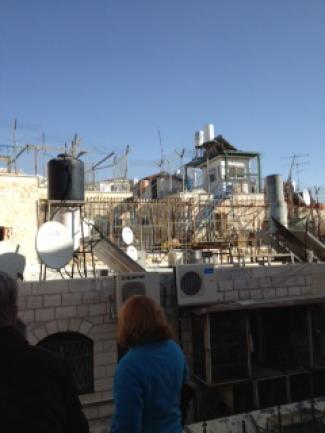Episcopalians from the Diocese of Massachusetts had both “an enlightening spiritual experience” and a taste of political reality during their Jan. 14-25 trip to Israel and Palestine.
Bishop Gayle E. Harris said before the trip that it was intended as “both a pilgrimage to enhance and enrich our faith” and “a mission trip to understand the situation of the church in the Holy Land.”
Though bouts with flu slowed a couple of the travelers, including Harris, good care was readily available, she said upon return, and with three medical doctors in the group, they managed to keep moving and meet both objectives.
Harris and the Rev. Thomas Brown, Rector of the Parish of the Epiphany in Winchester, led the trip. They were accompanied by 14 fellow travelers from parishes in Foxboro, Andover, Medford, Needham and Watertown, in addition to Winchester.
“Our trip to the Holy Land was an enlightening spiritual experience, and praying at the Western Wall was quite moving,” Dr. Donald DeLollis of Christ Church in Andover, said by e-mail. “Now when I read or hear passages from the Gospels I can picture the places where the events happened, which is especially meaningful in this most holy season.”
The group spent time visiting holy sites in Jerusalem, Bethlehem and Nazareth, renewing baptismal vows at the River Jordan and worshiping with fellow Episcopalians at St. Paul’s Church in Shefa’amr, in northern Israel—a small congregation, given that many Palestinian Christians are emigrating because of the difficult economy and political situation.
The group also made a visit to one of the Episcopal Diocese of Jerusalem’s hospitals, St. Luke’s in Nablus in the West Bank, and toured its neonatal intensive care unit where incubators purchased with the help of donations from the Diocese of Massachusetts are in use. The old incubators they were meant to replace, ones being held together with tape, were still in use, Harris noted, demonstrating both continuing resourcefulness and need.
“It was shocking to me to learn that the infant mortality rate of Palestinian babies is fivefold higher than those of Israeli infants,” the Rev. Holly Hartman said by e-mail. She is a deacon from Christ Church in Needham who has been appointed to help coordinate diocesan global mission projects. St. Luke’s Hospital provides health care and jobs to West Bank residents, regardless of their religion. Like many other schools and hospitals in Palestine, Hartman said, it relies heavily on donations in order to continue serving patients.
An emerging area of health care need that the group heard about is for breast cancer awareness and treatment programs for Palestinian women.
Hartman said it was “a wonderful and complex trip in every way” with “so many unexpected moments of wonder, learning and struggle over the complicated political situation.”
Israeli parliamentary elections took place during the Massachusetts group’s visit. A strong centrist-party showing weakened Prime Minister Benjamin Netanyahu’s hard-right position and would require the formation of a new coalition government, raising hopes for some that peace negotiations between Israel and Palestine might have a new chance.
Bishop Gayle Harris said the Massachusetts group encountered “some limited optimism” in that direction, but also fear and impatience among the Palestinians they visited and a desire for more unity among Palestinian governing factions.
Hartman, for whom this was a first-time visit to Israel and Palestine, said she came away with a sense of need for more education and opportunities “for Western Christians, such as ourselves, to witness firsthand the injustices occurring in Palestine that affect our brothers and sisters. For example, we were shocked to see the size and scope of the dividing wall built by the Israeli government as a response to Palestinian suicide bombings. We witnessed this particularly in the sacred town of Bethlehem. The wall cuts people off from reaching their loved ones, their farming land and their ability to travel freely, creating a prison-like situation,” she said, for the Palestinians who have nothing to do with terrorism. “There remains the need for development of a healthy peace plan so that the Israelis and Palestinians can live together in the land that is so holy for Jews, Muslims and Christians,” she said.
The January trip was one in a series that Harris has been leading over the past year to provide just such firsthand experiences. The next trip is scheduled for Nov. 11-22. She encourages anyone who is interested to contact her office for more information (dianep@diomass.org or 617-482-4826, ext. 349).

